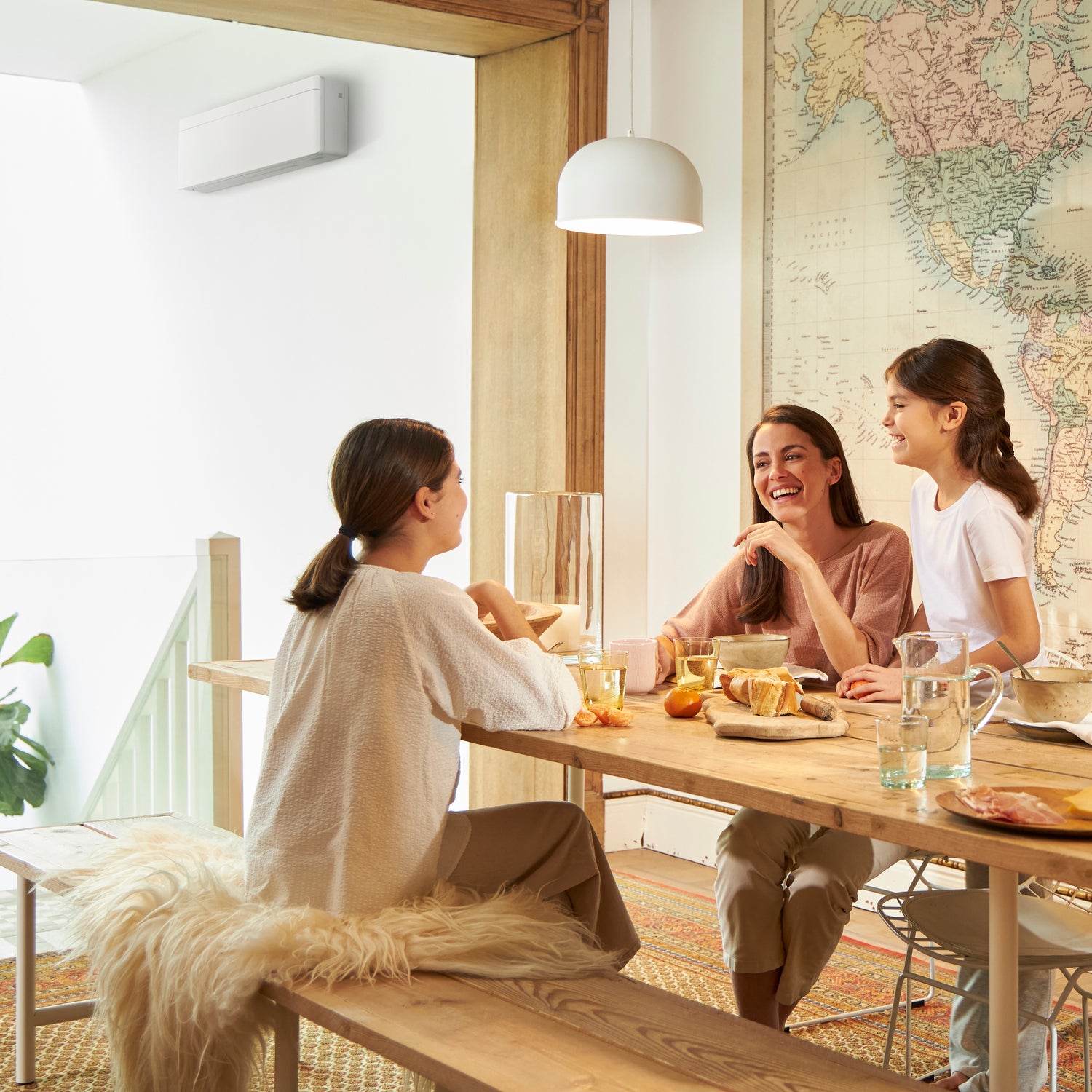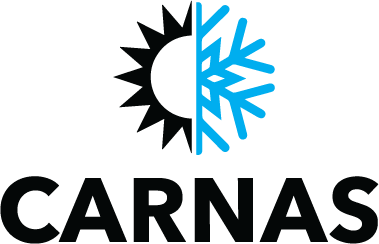Customer service.

Your comfort is our priority.
At Carnas Airco we strive to make your experience with our services and products as pleasant as possible. Do you have questions, are you unsure, or is your answer not in the frequently asked questions? Our customer service is there for you. From advice to warranty information and more, we're here to answer all your questions.
FREQUENTLY ASKED QUESTIONS
FAQ
What is an air-to-air heat pump?
An air-to-air heat pump, also known as air conditioning, extracts energy from the outside air to heat or cool your home. It works like a refrigerator, taking heat from the outside air to heat the inside air. This makes it a sustainable and efficient way to make your home comfortable.
How does an air-to-air heat pump work?
A heat pump transports heat from outside to inside, similar to how a refrigerator works but in reverse. It extracts heat from the outside air, even in cold temperatures, and uses it to heat your home. This is done via a refrigerant that absorbs and releases heat. Although a heat pump runs on electricity, it gets most of its energy from the outside air, meaning it is only a quarter dependent on electricity. This electricity can come from the regular grid or from solar panels for an even more sustainable solution.
Can you combine air conditioning with a central heating boiler?
Yes, you can certainly combine air conditioning with a central heating boiler and even save energy! By using your boiler to keep your home at a basic temperature, for example 15 degrees, and only turning on the air conditioning when you are at home and want to increase the temperature, you can save up to 30% on your gas consumption. This is a smart way to keep your home warm and save energy at the same time.
Why should I choose an air-to-air heat pump?
Everyone strives to reduce their energy costs, and with a view to the climate and energy transition, everyone's involvement is important. Our systems help you achieve this in a simple way. No major renovation is required, you can immediately influence your energy consumption and the system is easy to adapt. In addition, the system has almost no warm-up time, so you can enjoy warmth or coolness within minutes.
How much energy does the heat pump use?
The A+++ units we install consume only 1 kWh. This is due to the high efficiency of air conditioners. They obtain energy (heat) from the environment, with 80% of the energy coming from the ambient air and only 20% from electricity. The electricity is only used for the fan and compressor, not for an energy-consuming heating coil.
Is this system suitable for all homes?
Yes, in most cases. Whether it is an older home, renovation or new construction project, an air-to-air heat pump can meet all your heating and cooling needs. Our flexible systems are easy to install, without expensive renovations or replacements of existing systems. They have an A+++ energy efficiency class and meet all requirements for environmentally friendly buildings. It is important that the outdoor unit is placed in a suitable location where it will not cause any nuisance in terms of appearance or noise.
What should I pay attention to when determining the position of the indoor unit?
Make sure there is sufficient air circulation in the room; the unit requires at least 100 mm space from the ceiling. The air conditioner must also be mounted on a flat wall. The unit is preferably placed in the middle of the wall for optimal air flow. The units are approximately 80 cm wide and 30 cm high.
How much noise does the air conditioning produce?
The noise level of the indoor unit usually varies between 19 and 30 dB(A), depending on the model and fan speed. This is comparable to whispering, so you hardly notice that the air conditioning is on.
For the outdoor unit, the noise level is usually between 45 and 55 dB(A), depending on the model. To avoid noise pollution, it is important to place the outdoor unit in a suitable location, away from bedroom windows.
The air conditioners from brands such as Daikin, Samsung, Haier and Mitsubishi that we offer are known for their low noise level and are therefore among the quietest options on the market.
What about defrosting and drafts?
An air conditioner (air-to-air heat pump) blows air into the room - cool in the summer and warm in the winter. However, this can be experienced as a draft if the air is not warm enough. Correct placement, zone control or follow-me function can prevent this. Our units do not blow cold air during the defrost cycle.
An air conditioner cannot heat continuously. At outside temperatures below 7 degrees, the air conditioning condenser must defrost, which usually takes about 5 minutes. This can happen up to twice an hour, depending on the temperature and humidity.
How do you compare the energy efficiency of the systems?
There are three important values:
1. Energy efficiency: shown in classes G to A+++, with a higher class indicating better efficiency.
2. SEER: Seasonal Energy Efficiency Ratio for cooling. The higher the value, the more efficient.
3. SCOP: Seasonal Coefficient of Performance for heating. Higher values indicate better performance.
What are the advantages of air conditioning?
An air conditioner has several advantages. First, the installation does not require any costly remodeling. It provides year-round comfort by providing both heating and cooling. Moreover, it leads to energy savings due to its efficient operation. The system responds quickly, ensuring that the indoor climate quickly reaches the desired temperature. Finally, it ensures a healthier indoor environment through air filtration.
What do they mean by refrigerant?
Refrigerants are substances that transfer heat between the indoor and outdoor units of an air conditioner. They must have a low boiling point and are often composed of chemical compounds.
Older refrigerants are harmful to the environment and may no longer be used in new systems. Although today's refrigerants are less harmful, they still require careful handling by certified technicians to prevent leaks and other problems. Innovations are being worked on, including the use of natural refrigerants such as propane.
Is heating with air conditioning better for the environment?
An air conditioner (air/air heat pump) is more environmentally friendly than a central heating boiler. A central heating boiler runs on gas, which emits CO2 when burned, which is harmful to the environment. A heat pump runs on electricity, which can be generated from solar energy, wind energy (green energy) or gray energy. Although gray electricity is not optimal for the environment, it is still better than using a central heating boiler. An air conditioner uses less electricity than a central heating boiler uses gas.
How much do you save by heating with air conditioning?
Currently, a cubic meter of gas costs about €1.45, while electricity costs about 40 cents per kWh. Heating with air conditioning uses less than 1 kWh per hour, which amounts to approximately 40 cents per hour. Three air conditioners are often used to heat a terraced house, with the units in the bedrooms only running to a limited extent, which we include 50% of in the calculation. The total costs for heating with air conditioning are 80 cents per hour.
An average central heating boiler uses 1 to 2 cubic meters of gas, which corresponds to €1.45 to €2.90 per hour.
What is the delivery time?
Our systems can be delivered and installed within 48 hours of approval of the quotation.
Do I have a warranty on my air conditioning?
Absolute! Your air conditioner comes with a standard 5-year manufacturer's warranty, provided annual maintenance is demonstrated. We also offer maintenance contracts.
Still have questions?
Please contact us easily via WhatsApp.
Or fill in the contact form below and we will contact you within 24 hours.
